SRM-AP All News
ALL News
- Embarking on a new journey with pride June 29, 2022
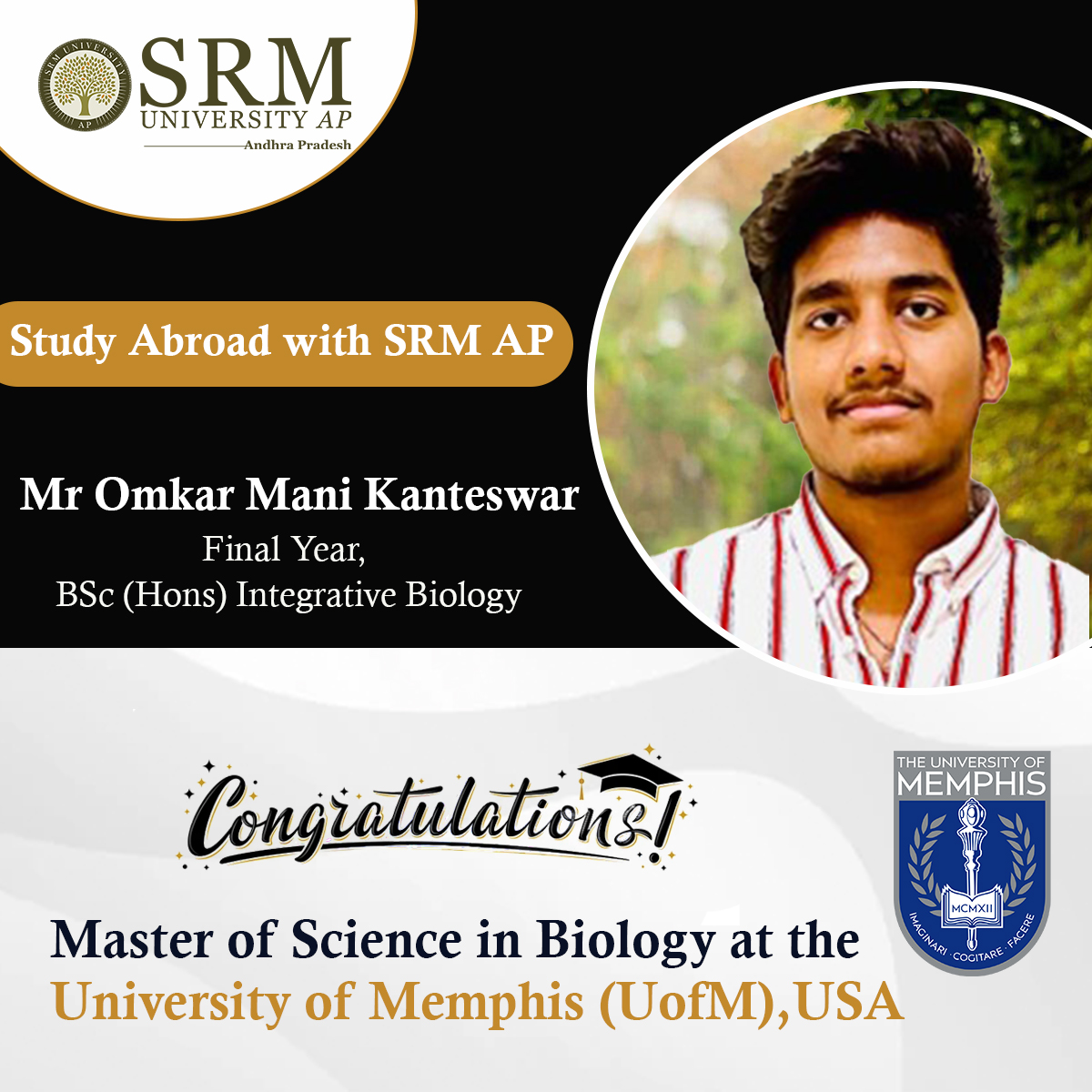 Final year BSc (Hons) Integrative Biology student Mr Omkar Mani Kanteswar has received an admission offer for the Master of Science in Biology at the University of Memphis (UofM), USA. Omkar’s happiness has no bounds as he really worked hard to get into his dream university.
Final year BSc (Hons) Integrative Biology student Mr Omkar Mani Kanteswar has received an admission offer for the Master of Science in Biology at the University of Memphis (UofM), USA. Omkar’s happiness has no bounds as he really worked hard to get into his dream university.The University of Memphis is a public research university in Memphis, Tennessee. Since Omkar is from a Bsc Biology background, he wanted to continue in the same research field. While shortlisting the universities, he found this research-oriented college. He passed the Duolingo test and IELTS to get into this college.
The Master of Science (MS) in Biology is a research-centred degree programme with an intensive core and elective curriculum. Omkar opted for this course owing to the fact that he wanted to continue his research in the field of Biology. His message for the junior batches is to be confident and independent to make their own decisions and not run with the herd. He urges them to focus on holistic development and extracurricular activities. He is also ready to provide support to them if they need any.
He extended his gratitude to the faculty members who helped him a lot in the process by giving him confidence. He was glad to have them because they consistently and positively helped him in his academics and choosing various colleges. Faculty from the Department of Biological Sciences- Prof Jayaseelan Murugaiyan (HOD), Assistant Professor Sutharsan Govindarajan, and Prof Imran Pancha hold significant positions in Omkar’s career venture.
Admission to a reputed institute means a sense of pride, the joy of knowing you would study the best things with the best ones. Omkar believes that this is just the beginning, and he is yet to do a lot more things with his precious life.
Continue reading → - Paper accepted in the prestigious conference to be held in Caneda June 27, 2022
The research paper, An under complete autoencoder for denoising computational 3D sectional images from the Department of Electronics and Communication Engineering has been accepted in a prestigious conference called Imaging and Applied Optics Congress to be held in Vancouver, Canada 2022. Assistant Professors; Dr Sunil Chinnadurai, Dr Karthikeyan Elumalai, Dr Inbarasan Muiraj, and the PhD students; Ms Vineela Chandra Dodda and Ms Lakshmi Kuruguntla are the authors who contributed to composing the paper.
Abstract
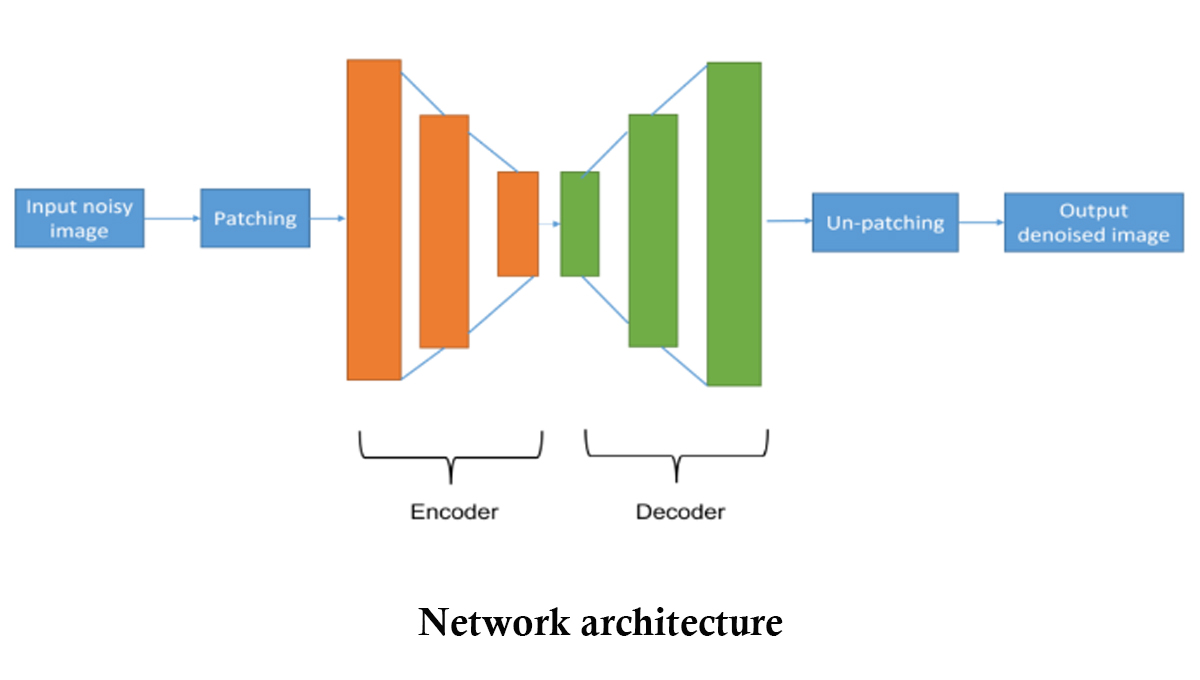 This paper proposes to use a deep-stacked under complete autoencoder to denoise the noisy 3D integral (sectional) images with a patch-based approach. In this process, the noisy input 3D sectional image is divided into multiple patches, which are then used to train the neural network. By using the patch-based approach, the time required to prepare the labeled training data is greatly reduced. Results demonstrate the feasibility of our proposed model in terms of the peak-signal-to-noise ratio.
This paper proposes to use a deep-stacked under complete autoencoder to denoise the noisy 3D integral (sectional) images with a patch-based approach. In this process, the noisy input 3D sectional image is divided into multiple patches, which are then used to train the neural network. By using the patch-based approach, the time required to prepare the labeled training data is greatly reduced. Results demonstrate the feasibility of our proposed model in terms of the peak-signal-to-noise ratio.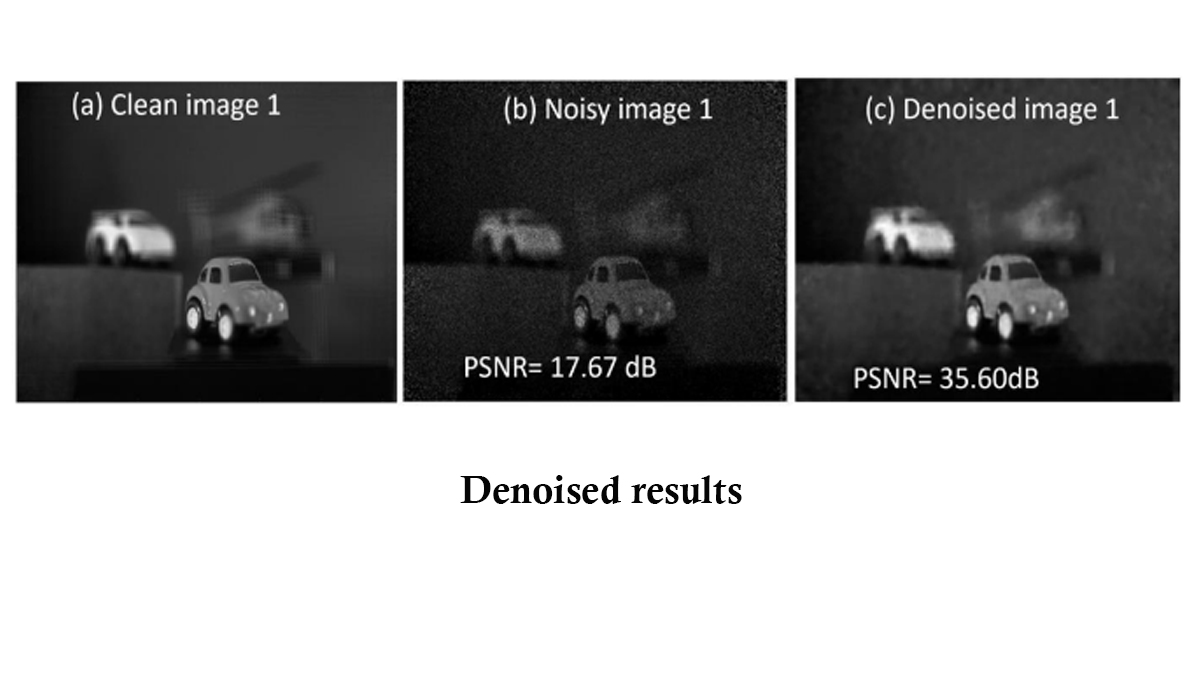 Explanation of the research
Explanation of the researchDenoising is one of the preliminary processes in image processing that removes noise from an image of interest and restores a clean image. The noise which was generated during the image acquisition process is attenuated using deep learning techniques. The denoised image is further used in various tasks of image processing.
In any image acquisition system, noise is inevitable and needs to be attenuated before further processing for qualitative results. The medical field is an example of this (images acquired through CT, MRI, PET, etc.). The researchers further investigate various techniques in deep learning to improve the denoising performance along with the applicability of deep learning in various tasks such as object recognition etc.
Continue reading → - A new aqueous electrolyte to enhance the yield of Ammonia June 25, 2022

The Department of Physics is proud to announce that Prof Ranjit Thapa and his PhD scholar Mr Samadhan Kapse have published an article titled “Lewis acid-dominated aqueous electrolyte acting as co-catalyst and overcoming N2 activation issues on catalyst surface” in the most prestigious and highly cited multidisciplinary research journal, ‘Proceedings of the National Academy of Sciences’ (PNAS), having an Impact Factor of 11.2. The research was done in collaboration with Ms Ashmita Biswas, Mr Bikram Ghosh, and Dr. Ramendra Sundar Dey from the Institute of Nano Science and Technology (INST), Punjab.
Abstract of the Research
The growing demands for ammonia in agriculture and transportation fuel stimulate researchers to develop sustainable electrochemical methods to synthesize ammonia ambiently, to get past the energy-intensive Haber Bosch process. But the conventionally used aqueous electrolytes limit N2 solubility leading to insufficient reactant molecules in the vicinity of the catalyst during electrochemical nitrogen reduction reaction (NRR). This hampers the yield and production rate of ammonia, irrespective of how efficient the catalyst is. Herein we introduce a new aqueous electrolyte (NaBF4), which not only acts as an N2-carrier in the medium but also works as a full-fledged “co-catalyst” along with our active material MnN4 to deliver high yield of NH3 (328.59 μg h-1 mgcat-1) at 0.0 V vs RHE. BF3-induced charge polarization shifts the metal d-band center of MnN4 unit close to the Fermi level, inviting N2 adsorption facilely. The Lewis acidity of the free BF3 molecules further propagates their importance in polarizing the N≡N bond of the adsorbed N2 and its first protonation. This push-pull electronic interaction has been confirmed from the change in d-band center values of MnN4 site as well as charge density distribution over our active model units, which turned out to be effective enough to lower the energy barrier of the potential determining steps of NRR. Resultantly, a high production rate of NH3 (7.37 × 10-9 mol s-1 cm-2) was achieved, approaching the industrial scale where the source of NH3 was thoroughly studied and confirmed to be chiefly from the electrochemical reduction of the purged N2 gas.
A Brief Summary of the Research
The widely highlighted problem of NRR is that the competitive HER is most likely worked upon with several catalyst development and electrolyte modifications, while the N2 solubility and activation issues in the aqueous medium are generally neglected. This work justifies our aim to contribute towards this troublemaker by using NaBF4 as a working electrolyte, which served as a “full-packaged co-catalyst” along with MnN4, reinforcing the NRR kinetics at the cost of low overpotential. The Lewis-acidic nature of BF3 induced adduct formation with the N2 molecules acted as a carrier of N2 gas into the medium in vicinity of the electrocatalyst. Simultaneously, the charge polarization over MnN4 active site due to BF3 delocalized the metal d-band centre, which triggered N2 adsorption on the catalyst site. Under this condition, free BF3 form the medium interacted with the adsorbed N2 and brought about the facile polarization of the N≡N bond and its first protonation at a much lower energy barrier. This push-pull charge transfer effect enormously helped to overcome the potential determining steps and this BF3 mediated NRR resulted in a huge production rate of NH3, which could be compared to that of industrial scale, which was not achieved so far with any aqueous or ionic liquid electrolytes. In short, this kind of user-friendly aqueous electrolyte is being investigated for the first time for NRR. Since BF3 displayed tremendous potential in triggering the kinetics of NRR, this new finding may encourage researchers to work more on aqueous electrolyte designing towards an even improved NRR performance of the electrocatalysts. Not only that, electrocatalysts could also be functionalized with BF3 derivatives, which could be one entirely new route of study in the field of NRR.
Social Implications
Ammonia is considered as the most abundant and widely used synthetic fertilizer in the world. The sole mean of large-scale ammonia production relies on the century-old Haber-Bosch process, which takes in more energy than it can produce, while the electrochemical nitrogen reduction reaction (NRR) offers a carbon-free and sustainable way of ammonia synthesis. However, electrochemical NH3 synthesis is often arrested by a few factors such as NH3 detection, contaminations from source gases, nitrogen-containing chemicals and the presence of labile nitrogen in the catalysts. In the recent past, several protocols have been proposed to correct the fallacious results. Recently, Choi et el. have concluded that it is difficult to believe from the too-low yield rate of NH3 that the reduction of N2 has actually occurred in the aqueous medium. It is noteworthy that the electrolyte plays a crucial role and offers a suitable environment for any electrochemical reactions to occur. However, the issue with the solubility of N2 in conventional aqueous electrolytes is a real troublemaker to achieve a high yield and production rate of NH3 during electrochemical synthesis. Therefore, it is necessary to solve the most important issue i.e., to solvate a promising concentration of N2 molecules into the electrolyte such that it becomes accessible to the catalyst surface for its subsequent reduction.
- Deep learning enabled IRS for 6G intelligent transportation systems June 24, 2022
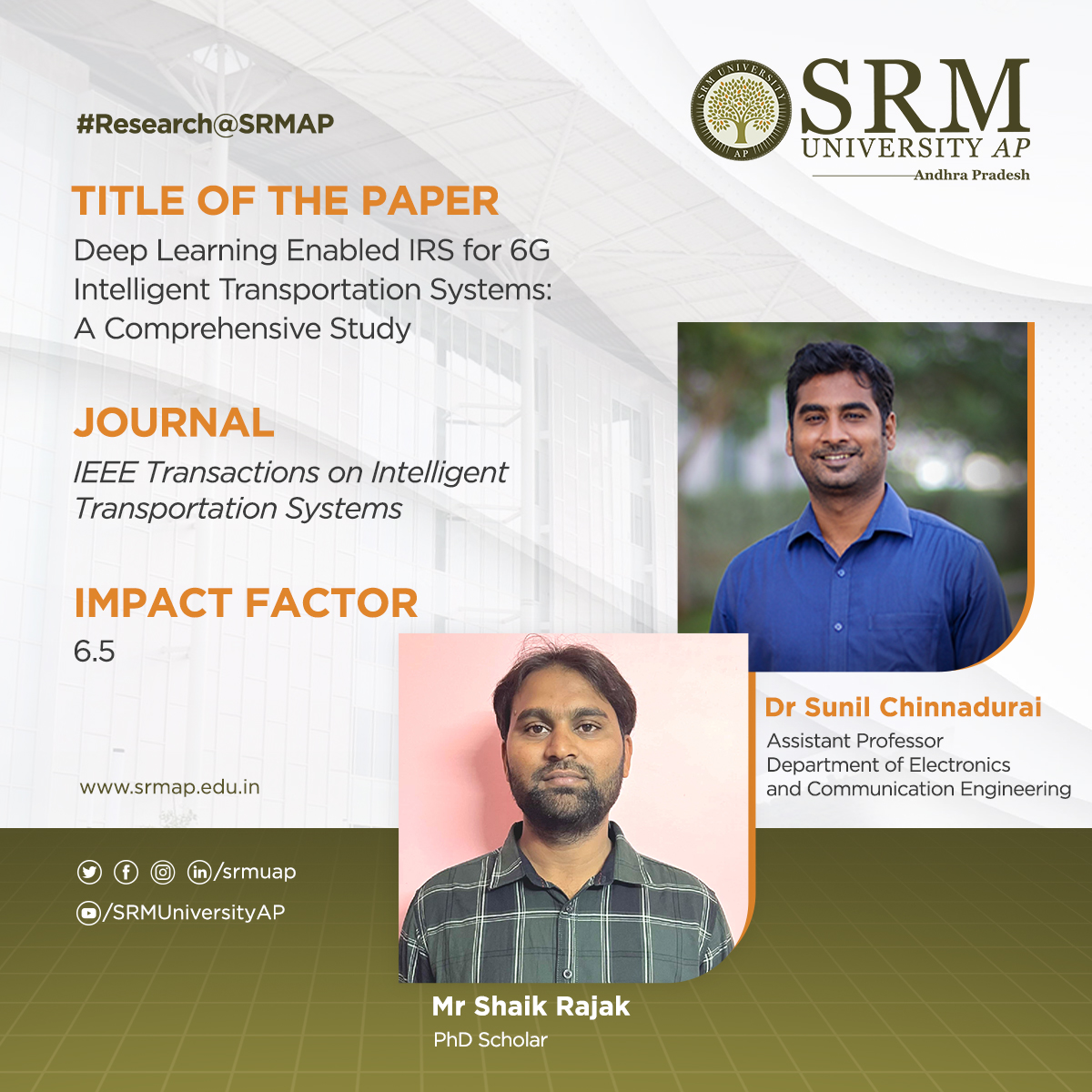
Intelligent Transportation System (ITS) is on its way to becoming the biggest player in the coming-of-age transportation system. However, the sheer demand for the enormous amount of data to secure seamless connectivity and functioning with maximum speed and safety tends to increase the power consumption of the ITS. Dr Sunil Chinnadurai and his PhD scholar Mr Shaik Rajak from the Department of Electronics and Communication Engineering present Intelligent Reflecting Surfaces (IRS) as the key enabling technology to provide the data required by the ITS with less power consumption.
Their article “Deep Learning Enabled IRS for 6G Intelligent Transportation Systems: A Comprehensive Study” which makes a comprehensive study on the DL-enabled IRS-aided ITS was published in the esteemed journal ‘IEEE Transactions on Intelligent Transportation Systems’ having an Impact factor of 6.5. The article elucidates the ways and means to overcome the channel estimation, secrecy rate, and energy efficiency optimisation problems.
The research suggests that connecting ITS to wireless networks via IRS will help in reaching the destination within the stipulated time duration with enhanced safety and comfort. Besides highlighting the reduced power consumption and hardware cost of the DL-enabled IRS-aided ITS, the article also projects that IRS usage in 6G-ITS massively helps the traffic control system to precisely send and receive the information of school buses as well as healthcare vehicles like ambulances, fire safety vehicles, etc. Their future research plans also include the experimental analysis of energy efficiency for wireless networks and Intelligent Transportation Systems with IRS.
Abstract of the Research
Intelligent Transportation Systems (ITS) play an increasingly significant role in our life, where safe and effective vehicular networks supported by sixth generation (6G) communication technologies are the essence of ITS. Vehicle-to-vehicle (V2V) and vehicle-to-infrastructure (V2I) communications need to be studied to implement ITS in a secure, robust, and efficient manner, allowing massive connectivity in vehicular communications networks. Besides, with the rapid growth of different types of autonomous vehicles, it becomes challenging to facilitate the heterogeneous requirements of ITS. To meet the above needs, intelligent reflecting surfaces (IRS) are introduced to vehicular communications and ITS, containing the reflecting elements that can intelligently configure incident signals from and to vehicles. As a novel vehicular communication paradigm at its infancy, it is key to understand the latest research efforts on applying IRS to 6G ITS as well as the fundamental differences with other existing alternatives and the new challenges brought by implementing IRS in 6G ITS. In this paper, we provide a big picture of deep learning enabled IRS for 6G ITS and appraise most of the important literature in this field. By appraising and summarizing the existing literature, we also point out the challenges and worthwhile research directions related to IRS aided 6G ITS.
- Twisted conjugacy in linear algebraic groups June 23, 2022
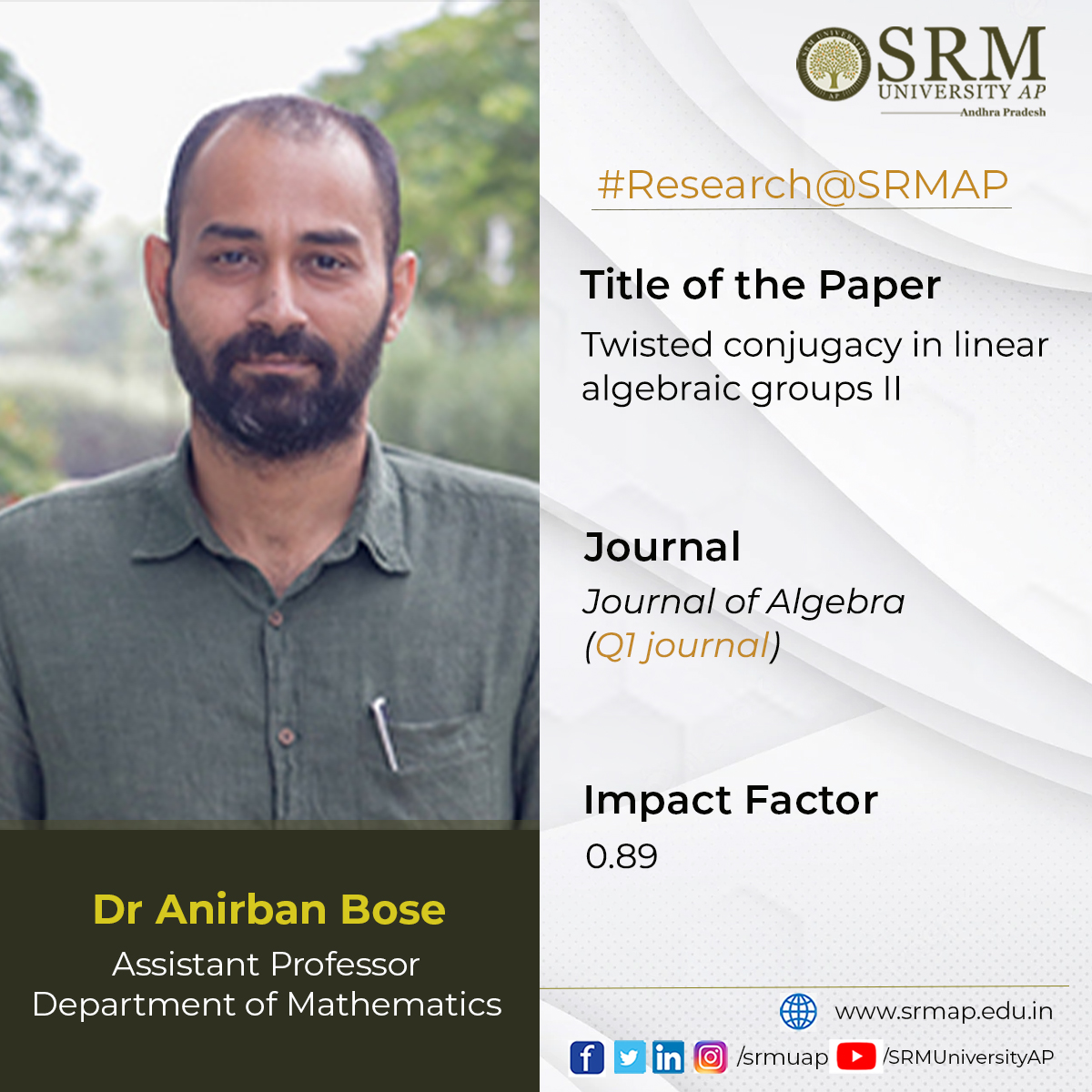
The Department of Mathematics is glad to announce that Dr Anirban Bose, Assistant Professor, has published an article, ‘Twisted conjugacy in linear algebraic groups II’ in the Q1 journal, Journal of Algebra. The paper was published in collaboration with Sushil Bhunia from Indian Institute of Science Education& Research, Mohali. The present work and its prequel “Twisted conjugacy in linear algebraic groups” are concerned with computing the number of orbits of a twisted conjugacy action of an algebraic group on itself. Dr Bose’s interests mainly lie studying the properties of groups of matrices.
Here’s the link to the article.
Continue reading → - Engineering the art of discovering similar song patterns June 22, 2022
The power of merging art with science is beyond our imagination. This amalgamation can pull off things that may seem insurmountable without the assistance of the other. Professor Hiren Deva Sarma, Guest faculty of the Department of Computer Science and Engineering, has developed a computational technique to find the similarity between the given songs in a pool. His paper titled An Approach to Discover Similar Musical Patterns has been published in IEEE ACCESS, a Q1 journal with an impact factor of 3.36.
Abstract
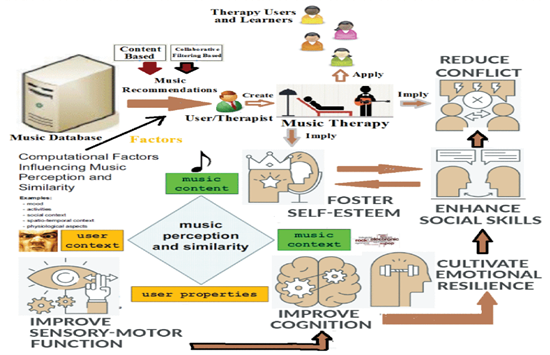 An algorithm has been developed to find the similarity between given songs. The song pattern similarity has been determined by knowing the note structures and the fundamental frequencies of each note of the two songs under consideration. The statistical concept, Correlation of Coefficient, is used in this work. The correlation of Coefficient is determined by applying the 16 Note-Measure Method. If the Correlation of Coefficient is near 1, it indicates that the patterns of the two songs under consideration are similar. Otherwise, there exists a certain percentage of similarity only. This basic principle is used in a set of Indian Classical Music (ICM) based songs. The proposed algorithm can determine the similarity between songs, so alternative songs in place of some well-known songs can be identified in terms of the embedded raga patterns. A digital music library has been constructed as a part of this work. The library consists of different songs, their raga name, and their corresponding healing capabilities in terms of music therapy. The proposed work may find application in the area of music therapy. Music therapy is an area of research that has been explored significantly in recent times. This work can also be exploited for developing an intelligent multimedia tool applicable in the healthcare domain. A multimedia-based mobile app has been developed encapsulating the abovementioned idea that can recommend alternative or similar songs to the existing ICM-based songs. This mobile app-based music recommendation system may be used for different purposes, including entertainment and healthcare. As a result of the applications of the proposed algorithm, similar songs in terms of raga patterns can be discovered from within the pool of a set of songs. A Music Recommendation System built on this algorithm can retrieve an alternative song from within the pool of songs as a replacement to a well-known song, which otherwise may be used for particular music therapy. Results are reported and analysed thoroughly. The future scope of the work is outlined.
An algorithm has been developed to find the similarity between given songs. The song pattern similarity has been determined by knowing the note structures and the fundamental frequencies of each note of the two songs under consideration. The statistical concept, Correlation of Coefficient, is used in this work. The correlation of Coefficient is determined by applying the 16 Note-Measure Method. If the Correlation of Coefficient is near 1, it indicates that the patterns of the two songs under consideration are similar. Otherwise, there exists a certain percentage of similarity only. This basic principle is used in a set of Indian Classical Music (ICM) based songs. The proposed algorithm can determine the similarity between songs, so alternative songs in place of some well-known songs can be identified in terms of the embedded raga patterns. A digital music library has been constructed as a part of this work. The library consists of different songs, their raga name, and their corresponding healing capabilities in terms of music therapy. The proposed work may find application in the area of music therapy. Music therapy is an area of research that has been explored significantly in recent times. This work can also be exploited for developing an intelligent multimedia tool applicable in the healthcare domain. A multimedia-based mobile app has been developed encapsulating the abovementioned idea that can recommend alternative or similar songs to the existing ICM-based songs. This mobile app-based music recommendation system may be used for different purposes, including entertainment and healthcare. As a result of the applications of the proposed algorithm, similar songs in terms of raga patterns can be discovered from within the pool of a set of songs. A Music Recommendation System built on this algorithm can retrieve an alternative song from within the pool of songs as a replacement to a well-known song, which otherwise may be used for particular music therapy. Results are reported and analysed thoroughly. The future scope of the work is outlined.Explanation of the research
A computational technique has been developed to identify a particular song similar to another in terms of its embedded raga pattern. Indian Classical Music (ICM) based songs are considered in this work. As a result of the application of the proposed technique, it is possible to identify similar songs in terms of their raga patterns from within a pool of songs. Subsequently, a similar alternative song can be recommended for different applications, including music therapy. If we consider music therapy, an alternative medicine (note: here, medicine is the song) is possible to recommend due to the proposed technique. This algorithm will find many applications in the domain of music information retrieval (MIR) and music recommendation systems (MRS).
Practical implementation of the research
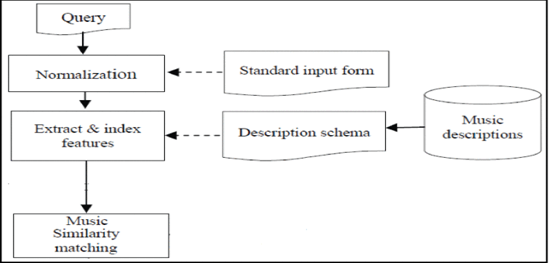 This algorithm may be applied in recommending music in music recommendation systems. Moreover, music information retrieval based on raga patterns can be an important domain where the proposed algorithm may be exploited. Considering the social implications, music therapy has been the intended area of the research; therefore, this algorithm has been developed considering numerous applications of music therapy based on Indian Classical Music. The music therapy community will be benefited from the proposed algorithm.
This algorithm may be applied in recommending music in music recommendation systems. Moreover, music information retrieval based on raga patterns can be an important domain where the proposed algorithm may be exploited. Considering the social implications, music therapy has been the intended area of the research; therefore, this algorithm has been developed considering numerous applications of music therapy based on Indian Classical Music. The music therapy community will be benefited from the proposed algorithm.In this research project, Professor Hiren Deva Sarma has collaborated with; Assistant Professor Sudipta Chakrabarty, Techno India, Salt Lake at the Department of Master of Computer Application; Mr Ruhul Islam, IT Consultant, Cloud Shine Global LLP; and Emil Pricop, Associate Professor in the Department of Automatic Control, Computers and Electronics, Petroleum-Gas University of Ploiesti, Romania.
In the future, the researchers look forward to exploring the music therapy capabilities of Indian Folk Music (IFM) like Kamrupia Lokgeet, Goalparia Lokgeet, and Baul Geet. Understanding the similarity and dissimilarity of the above-mentioned folk songs with Indian Classical Music (ICM) from computational musicology perspectives is another objective of the proposed research work. The researchers also aim to develop Music Recommendation Systems (i.e., applications) considering the songs mentioned above (ICM + IFM) and the different requirements of the users.
Continue reading → - Treading the path towards inner peace and freedom June 22, 2022
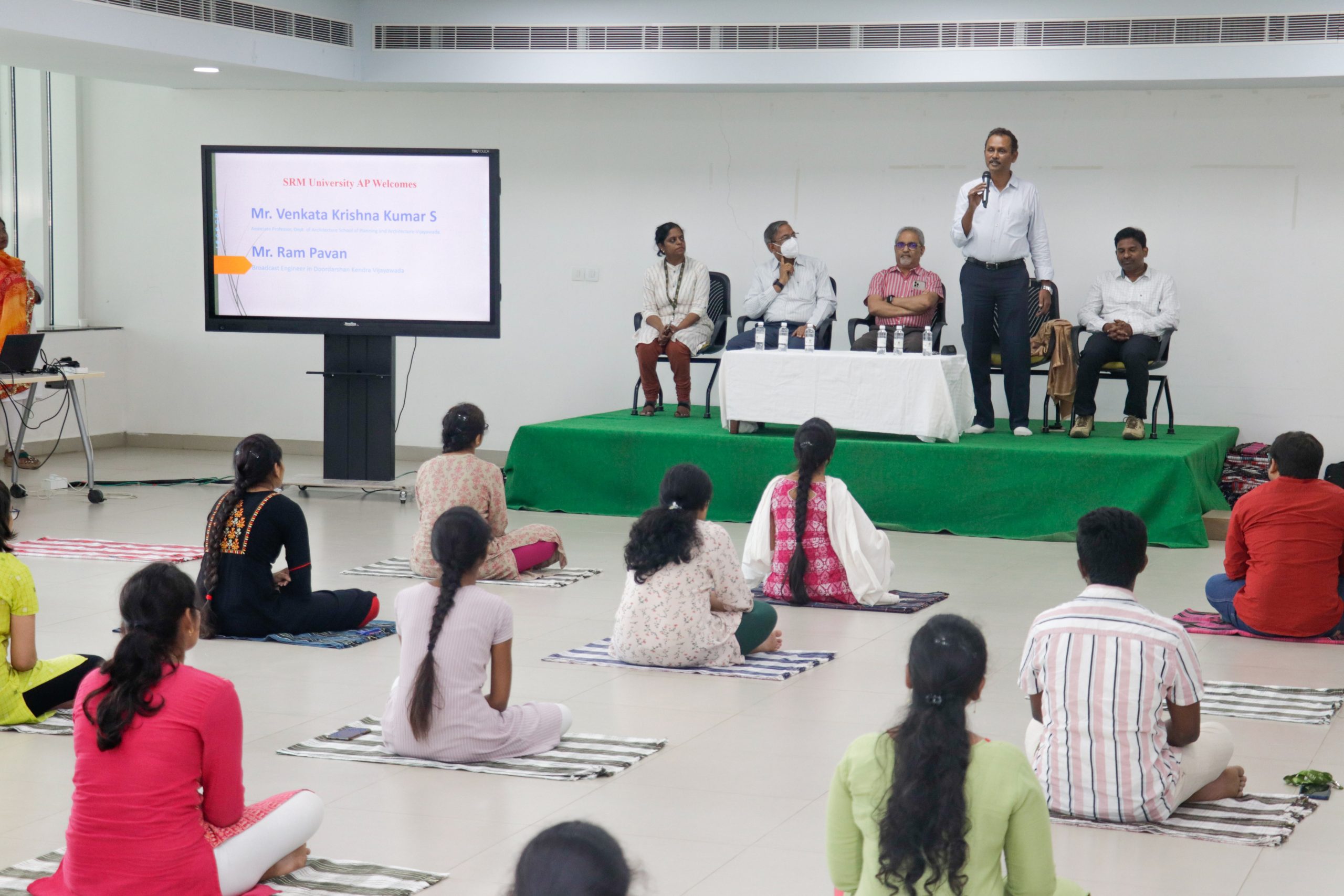
SRM University-AP celebrated International Yoga Day 2022 illuminating the vitality of practising yoga in the backdrop of the chaotic and disruptive scenario of the present times. Accomplished heartfulness practitioners Mr Venkata Krishna Kumar S and Mr Ram Pavan were the guests of honour of the day. Registrar Dr Prem Kumar, and Dean-SEAS Prof B V Babu, welcomed and felicitated the invitees.
Prof B V Babu addressed the gathering and expounded on the significance of Yoga. He highlighted the power of yoga in activating the connection between body, mind, and soul. Essentially, it is the lack of unison between these elements, which leads to a confused and disorganised self. He exhorted the students to make yoga an indispensable part of their lives to discover their higher selves.
Mr Venkata Krishna Kumar interacted with the students and rendered an edifying lecture on the true meaning and benefits of yoga. Emphasising the theme of this year’s yoga day, ‘Yoga for Humanity’, he spelt out how the word ‘unity’ is already embedded in humanity. The unrest and anarchy broken out across different parts of the world is undeniably a consequence of the absence of this unity. He expressed how yoga would help one to rise to a higher level of consciousness and unite with the world around.
He also focused on yoga’s power in liberating the mind from all meaningless entanglements and thoughts. Students were also made to meditate and reflect on all random thoughts that cropped up in their minds. Yoga is not just about physical exertion and regulating bodily functions. It fundamentally aims at bringing the mind under control and emancipating it from all worldly distress.
The session was presided over by Mr Ram Pavan. He shed light on different aspects of yoga and explained how it helps in exploring and purifying our consciousness. He also demystified the essence of heartfulness meditation and implored the students to practise meditation. Ms Revathi Balakrishnan, Assistant Director, Student Affairs, proposed the vote of thanks. The guests of honour were presented with mementoes as a token of gratitude for gracing the celebrations with their invaluable presence.
Continue reading → - Restoring the highly corrupted digital image June 21, 2022
The Electrochemical Society Transactions (ECST) is the official conference proceedings publication of The Electrochemical Society. Recently, a research paper was published in ECST by Mr Vasudeva Bevara, a PhD scholar of the Department of Electronics and Communication Engineering, under the supervision of Assistant professor Dr Pradyut Kumar Sanki. The paper is titled VLSI Architecture of Decision Based Adaptive Denoising Filter for Removing Salt & Pepper Noise and proposes an innovative concept to restore a highly corrupted digital image.
Abstract
Continue reading →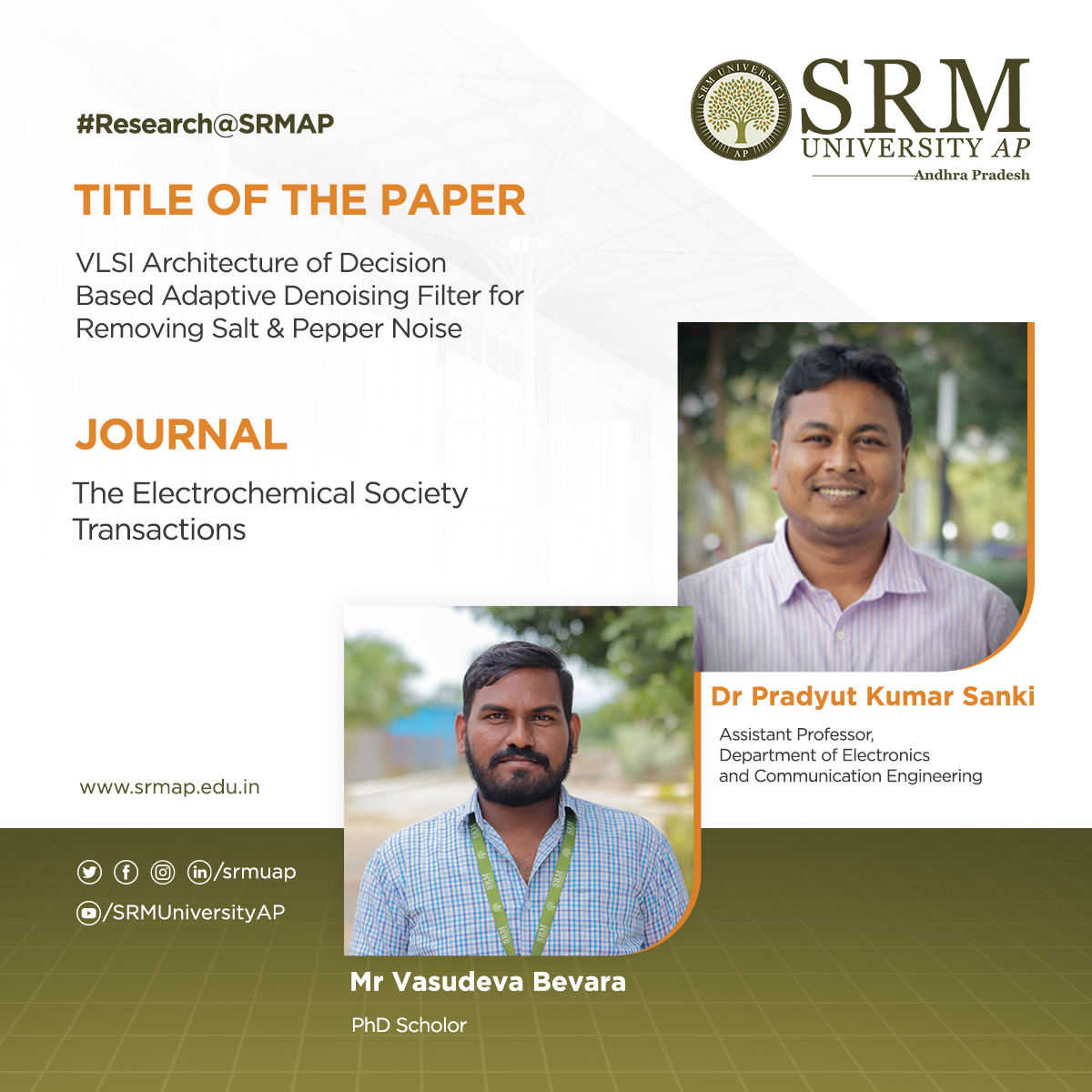 A new Decision Based Adaptive Denoising Filter (DBADF) algorithm and hardware architecture are proposed for restoring the digital image that is highly corrupted with impulse noise. The proposed DBADF detects only the corrupted pixels, and that pixel is restored by the noise-free median value or previous value based upon the noise density in the image. The proposed DBADF uses a 3×3 window initially and adaptively goes up to a 7×7 window based on the noise corruption of more than 50% by impulse noise in the current processing window. The proposed architecture was found to exhibit better visual qualitative and quantitative evaluation based on PSNR, IEF, EKI, SSIM, FOM, and error rate. The DBAMF architecture also preserves the original information of digital image with a high density of salt and pepper noise compared to many standard conventional algorithms. The proposed architecture has been simulated using the VIRTEX7 FPGA device, and the reported maximum post place and route frequency are 149.995MHz, and the dynamic power consumption is 179mW.
A new Decision Based Adaptive Denoising Filter (DBADF) algorithm and hardware architecture are proposed for restoring the digital image that is highly corrupted with impulse noise. The proposed DBADF detects only the corrupted pixels, and that pixel is restored by the noise-free median value or previous value based upon the noise density in the image. The proposed DBADF uses a 3×3 window initially and adaptively goes up to a 7×7 window based on the noise corruption of more than 50% by impulse noise in the current processing window. The proposed architecture was found to exhibit better visual qualitative and quantitative evaluation based on PSNR, IEF, EKI, SSIM, FOM, and error rate. The DBAMF architecture also preserves the original information of digital image with a high density of salt and pepper noise compared to many standard conventional algorithms. The proposed architecture has been simulated using the VIRTEX7 FPGA device, and the reported maximum post place and route frequency are 149.995MHz, and the dynamic power consumption is 179mW. - Tackling the menace of cyber poaching June 21, 2022
Wireless Sensor Networks (WSNs) and their derivatives such as Internet of Things (IoT) and the Internet of Industrial Things (IIOT) are no longer confined to traditional applications such as smart homes and transportation. It has already marked its presence in Industrial applications and extended even to wildlife conservation. The impending concerns associated with such wireless networks are their privacy and security. One such menace afflicting wildlife is cyber poaching. Taking this into consideration, Dr Manjula R, Assistant Professor, and her student Mr Tejodbhav Koduru, from the Department of Computer Science and Engineering, have published a paper, “Position-independent and Section-based Source Location Privacy Protection in WSN” in the journal, ‘IEEE Transactions on Industrial Informatics’ having an Impact Factor of 10.215. The article is published in collaboration with Ms Florence Mukamanzi from the University of Rwanda, Rwanda, Africa and Prof Raja Datta from IIT Kharagpur, West Bengal, India.
The sensors collect data about these endangered animals and report it to the central controller which is connected to the Internet. Over the period, the hunters have also evolved and are equipped with smart devices that help them to easily locate the animal with minimal effort. In the simplest form, the attacker or the hunter just eavesdrops on the communication links to know the message’s origin and backtrack to the source of information. Once the source of information i.e., the location is identified then the endangered animal is captured. To overcome such backtracking issues, their work aims at delaying the information disclosure to the attacker through traffic obfuscation.
Although it may not act as an ultimate solution, the research work focuses on contextual privacy, unlike traditional content privacy. The attacker collects only contextual information such as packet rate, traffic intensities, routing paths, time correlations etc., to determine the source of information. The work focuses on mitigating traffic correlation i.e., hop-by-hop backtrack attacks and protecting the assets that are monitored using WSNs. The performance metrics include safety period and network lifetime amongst other metrics. The proposed random-walk-based routing solution achieves an improved safety period and network lifetime compared to the existing schemes. The work was simulated using a custom-designed simulation tool and was validated with the numerical results obtained using mathematical models.
The proposed solutions could be seamlessly used in monitoring endangered animals such as rhinoceros or in military applications to track soldiers. In addition, the routing algorithm could also be used in delaying tolerant networks to improve the efficiency and lifetime of the network, in designing the random trajectories of bio-nano bots for intrabody monitoring etc. Their future research plan includes developing improved source location privacy preservation techniques for terrestrial and underwater wireless sensor networks using the benefits of Artificial Intelligence and Machine Learning. In addition, they also aims at the development of data collection and routing protocols for intrabody nanonetwork operating at tera hertz frequencies— next-generation networks, envisioned networks.
- Matrix enabled road distress classification system June 20, 2022
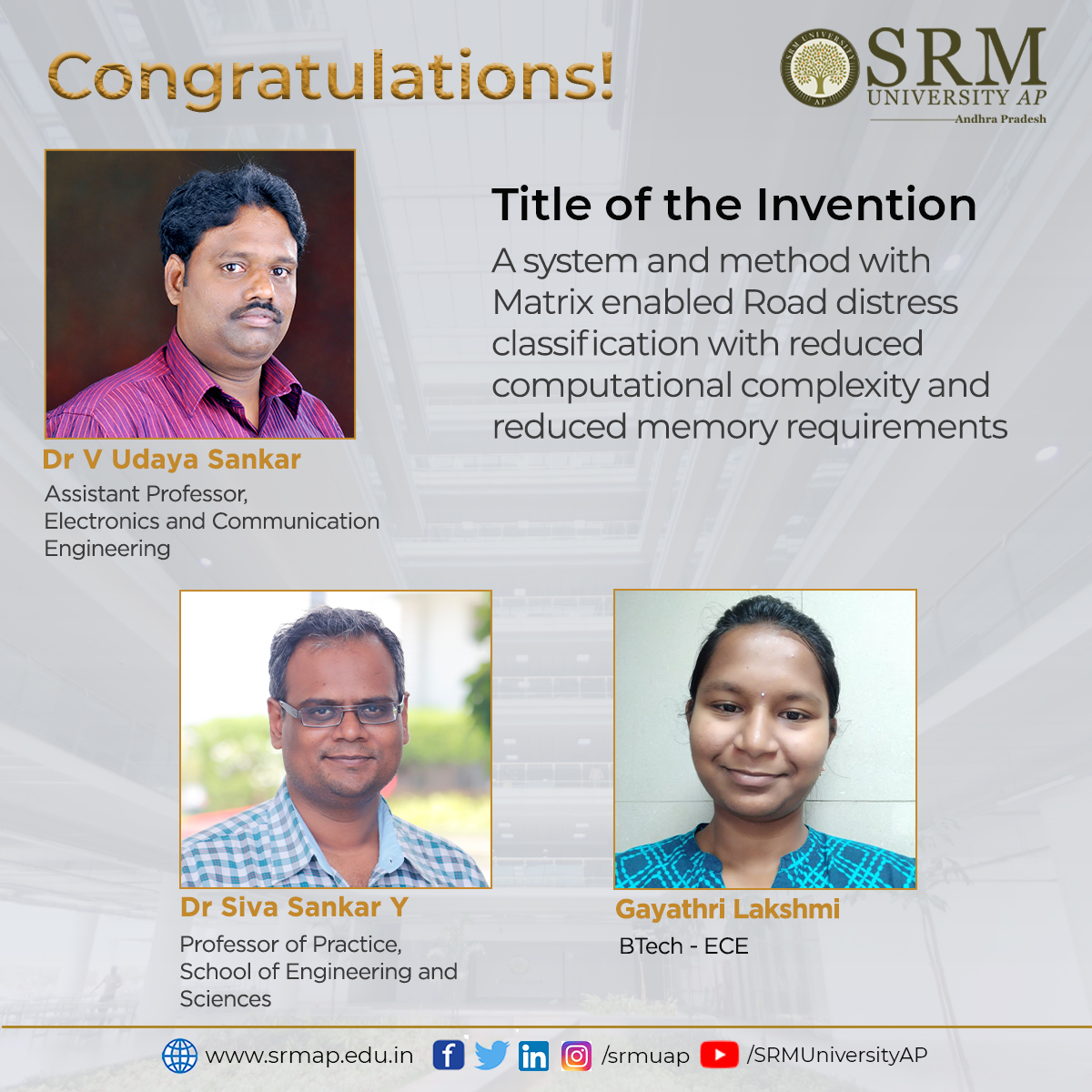
The Department of Electronics and Communication Engineering is glad to announce that Dr V Udaya Sankar, Assistant Professor has published the patent (App no. 202141056542), ‘A system and method with Matrix enabled Road distress classification with reduced computational complexity and reduced memory requirements’, in collaboration with Dr Siva Sankar Yellampalli and Ms Gayathri Lakshmi Chinthakrindi.
This work has applications related to visual inspection systems. While this research considers road crack detection application, the same can be extended to various applications such as leaf disease prediction, covid prediction etc. This invention provides an alternative approach instead of using traditional machine learning algorithms that has less computational complexity as opposed to deep neural networks that take more complex operations. This method will also lead to further research in matrix-based machine learning applications related to image processing and image classification.
The research team is planning to collaborate with Efftronics Systems Pvt ltd. for PCB defect detection and discussions are initiated with some start-ups for visual inspection applications. Their future research plan is to look deeper into these algorithms in combination with some of the deep neural networks to reduce computational complexity. In addition, Dr Udaya Sankar is also looking forward to establishing his own start-up in the incubation centre soon.
Abstract of the Research
A method for image classification is provided, wherein, the pre-processed gray scale image is first sent to the feature extraction block, and the said feature extraction block considers every image as a matrix and computes the metrics for features, viz., 1) EMD distance which is popularly known as Wassertain distance/Earth movers distance and is computed with respect to block image and 2) Frobenius Norm which is the square root of the sum of the absolute squares of its elements and finally, 3) Condition Number, which measures the ratio of the maximum relative stretching to the maximum relative shrinking that matrix does to any non-zero vectors. This method is preferred over the existing methods due to the drastic reduction in computational complexities and, utilizing lesser memory. Also, with this method and system, the communicational complexities too are significantly reduced and also, and the results yielded are far more significantly accurate.


